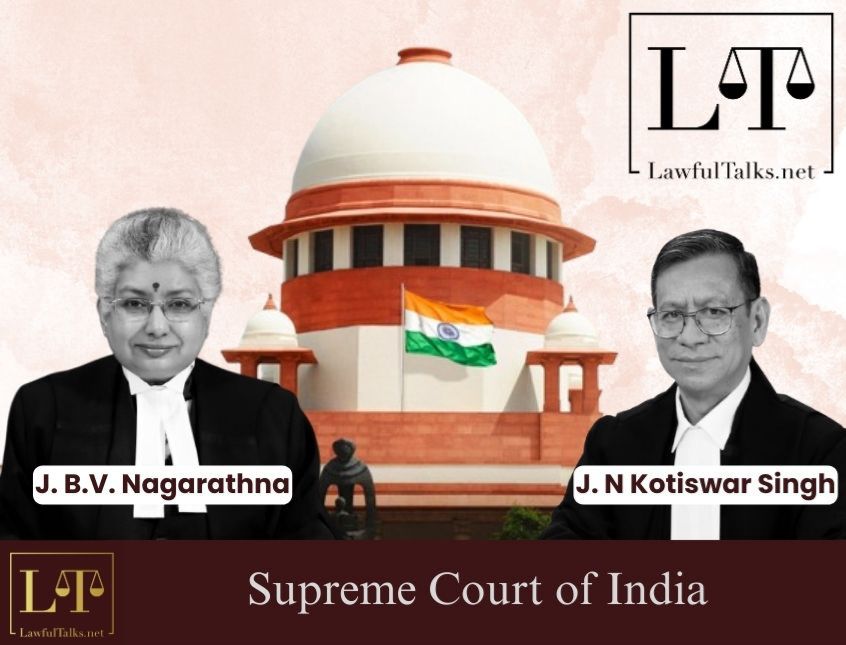Allahabad HC Sets Aside Afzal Ansari's Conviction, Allows Him to Continue as MP

The Supreme Court reiterated the principle that the transfer of ownership in immovable property requires the registration of a sale deed. Mere possession and payment of consideration are insufficient to confer ownership unless the transfer is executed through a registered instrument.

The dispute centered on a secured asset, a property located at Old Rajinder Nagar, New Delhi which was mortgaged by the original owner, Champa Bhen Kundia, to Associated India Financial Service Pvt. Ltd. on June 16, 2001. This loan was later assigned to Kotak Mahindra Bank. After a loan default, proceedings under the SARFAESI Act led to the public auction of the property in December 2010, with Sanjay Sharma emerging as the highest bidder.
The conflict arose when Respondent No. 2, Raj Kumar Vij, objected to the auction, claiming ownership of the basement of the property through an unregistered agreement to sell dated April 23, 2001. The auction was challenged, leading to prolonged litigation involving the Debt Recovery Tribunal (DRT), the Appellate Tribunal, and the Delhi High Court.
The appellant, Sanjay Sharma, purchased the property for ₹7,50,000, and Kotak Mahindra Bank issued a sale certificate in his favor on December 27, 2010. However, Respondent No. 2 contested the auction, claiming prior possessory rights.
Initially, the DRT ruled in favor of Respondent No. 2, holding that he had the right to redeem the property under Section 13(8) of the SARFAESI Act. This decision was overturned by the Appellate Tribunal in September 2014, which restored the validity of the auction. However, the Delhi High Court subsequently reversed the tribunal's decision, invalidating the auction sale and directing Respondent No. 2 to redeem the mortgage.
Aggrieved by the High Court’s order, the appellant approached the Supreme Court, seeking validation of the auction.
The Supreme Court meticulously analyzed the legal principles governing the transfer of ownership of immovable property. Referring to Section 54 of the Transfer of Property Act, 1882, the Court emphasized:
“In the case of tangible immovable property valued at one hundred rupees or more, the transfer can be made only through a registered instrument. The use of the term ‘only’ signifies that, for tangible immovable property valued at one hundred rupees or more, a sale becomes lawful only when it is executed through a registered instrument.”
The bench comprising Justice B.V. Nagarathna and Justice N.K. Singh unequivocally held that unregistered documents, including agreements to sell, do not confer ownership:
“Where the sale deed requires registration, ownership does not pass until the deed is registered, even if possession is transferred, and consideration is paid without such registration.”
Respondent No. 2 relied on a series of unregistered documents to claim ownership of the basement of the property. These included an unregistered sale deed executed by the original owner, Champa Bhen Kundia, in favor of her son, Chandu Bhai, and subsequent unregistered agreements involving third parties. The Court held that these documents failed to meet the requirements of a valid sale under Section 54 of the Transfer of Property Act, rendering Respondent No. 2’s claim invalid
The Court observed that neither Kotak Mahindra Bank nor the appellant could have detected the existence of these unregistered documents, even with due diligence. It further affirmed that the auction conducted under the SARFAESI Act complied with statutory requirements. The Court noted:
“The auction was in due compliance with the statutory requirements and constituted a valid sale.”
Addressing Respondent No. 2’s assertion of a right to redeem the property, the Court clarified that such a right is not absolute and is subject to statutory limitations. Referring to the unamended Section 13(8) of the SARFAESI Act, the Court held:
“The right of the borrower to redeem the secured asset was available till the sale or transfer of such secured asset. Subsequent to the amendment in 2016, the right of redemption is available only till the date of publication of the notice under Rule 9(1) of the Security Interest (Enforcement) Rules, 2002.”
The Court concluded that Respondent No. 2 had been given multiple opportunities to redeem the property but failed to avail them.
The Supreme Court set aside the Delhi High Court’s order and restored the Appellate Tribunal’s decision, upholding the validity of the auction sale. The Court directed Kotak Mahindra Bank to hand over possession of the property to the appellant and reserved the appellant’s right to seek further legal remedies for possession.
Case Title : Sanjay Sharma v. Kotak Mahindra Bank Ltd.




















































































































































































































































































































































































































































































































































































































































































































































